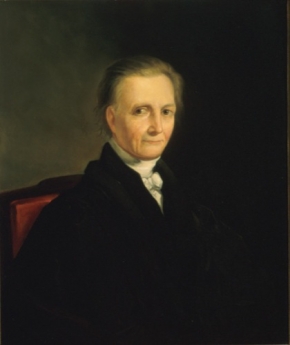You are here
Circuit Court Opinions:
Associate Justice Bushrod Washington, Corfield v. Coryell (1823)

Corfield v. Coryell, 6 F. Cas. 546 (C.C.E.D. Pa. 1823) (No. 3,230) [Third Circuit]
Corfield was another significant constitutional case Justice Washington decided while riding circuit. A resident of Delaware sued for trespass after his boat was seized because he had violated a New Jersey statute prohibiting nonresidents of the state from dredging for oysters in certain waters. The plaintiff claimed that the New Jersey law was unconstitutional because it violated Article IV, section 2 of the Constitution (also known as the Comity or Privileges and Immunities Clause), providing that “[t]he citizens of each state shall be entitled to all privileges and immunities of citizens in the several states.”
In ruling in favor of the defendants, Washington explained that the Comity Clause did not mean that “the citizens of the several states are permitted to participate in all the rights which belong exclusively to the citizens of any other particular state, merely upon the ground that they are enjoyed by those citizens.” New Jersey, therefore, was not obligated to extend to citizens of other states the same advantages with respect to fishing it granted to its own citizens.
In the course of his opinion, Washington explained his interpretation of the Comity Clause in detail. The privileges and immunities protected by the clause, he wrote, were those “which are, in their nature, fundamental; which belong, of right, to the citizens of all free governments.” These included “[p]rotection by the government; the enjoyment of life and liberty, with the right to acquire and possess property of every kind, and to pursue and obtain happiness and safety.” Washington added to these more specific rights, such as the right to pass through or reside in another state, to claim the benefit of the writ of habeas corpus, to sue in the courts of a state, to dispose of property, and to be exempt from higher taxes than those paid by other citizens of a state.
During Reconstruction, Washington’s interpretation of “privileges and immunities” became part of debates over the Civil Rights Act of 1866 and the Fourteenth Amendment. Many Republicans read Corfield as explicating rights of national citizenship to be protected against infringement by the states. Some cited the opinion in support of the incorporation thesis, which held that the first section of the Fourteenth Amendment operated to make the Bill of Rights applicable to state governments. In the Slaughterhouse Cases (1873), however, a majority of the Supreme Court rejected this reading of Corfield in holding that the Privileges or Immunities Clause of the Fourteenth Amendment applied to a very small subset of rights, while the states maintained sole responsibility for enforcement of the vast majority of rights.
